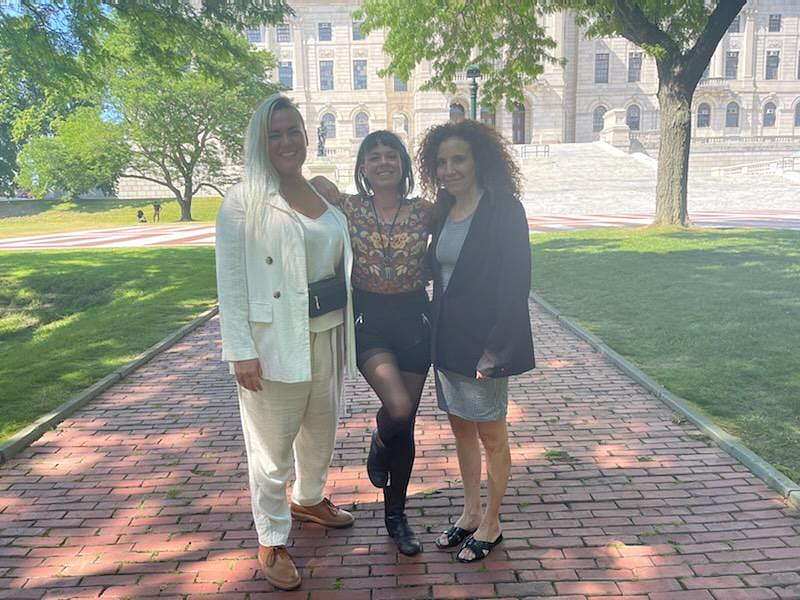June 13, 2022
DSW Research and Project Manager J. Leigh Oshiro-Brantly presented on the intersection of LGBTQIA individuals and sex workers’ rights at the June 13 meeting of a legislative study commission in Rhode Island. Oshiro-Brantly co-presented with Henri June Bynx, who is also a sex worker and activist.
Their presentation highlighted the parallels in the criminalization and stigmatization of sex work, gender identity, and sexual orientation. It delved into the inextricable links between the deleterious effects of marginalization both for sex workers and LGBTQIA individuals and their converging fights for equal freedoms and treatment under law. Oshiro-Brantly and Bynx grounded their presentation in data from Rhode Island and beyond demonstrating that LGBTQIA individuals and particularly those who engage in sex work are disproportionately targeted by the criminal justice sytem. They face harassment, profiling, and discrimination — and, once saddled with a criminal record because of this, they face extraordinary barriers to housing, employment, and other critical resources necessary to sustain life.
Their presentation concluded with the below recommendations for Rhode Island, though these recommendations are widely applicable to all states and municipalities:
1. Pass a law that grants immunity from prosecution to people engaged in commercial sexual activity if they report to law enforcement that they are victims of or witnesses to a crime. (Read more about Immunity/Good Samaritan laws as they relate to sex work here.)
2. Fully decriminalize consensual adult sex work.
3. Repeal “Loitering for Prostitution” and “Loitering for Indecent Purposes” which have become known as “Walking While Trans Bans” as law enforcement uses these statutes to profile, harass, and arrest transgender women.
4. Repeal Section a. In the Human Immunodeficiency Virus (HIV) Law (§ 11-34.1-12), which stipulates that: (a) Any person convicted of a violation of any provisions of chapter 34 shall be required to be tested for Human Immunodeficiency Virus (HIV). No consent for the testing shall be required.
5. Pass House Bill 5464 — patients will not be denied appropriate healthcare on the basis of their sex work history.
6. Pass Senate Bill 249/ House Bill 6049 — which would create a new criminal offense of “custodial sexual assault,” which occurs when a peace officer perpetrates a sexual assault while a victim is in their custody.
The RI study commission was formed last year following the unanimous passage of House Resolution 5250, which proposed a special legislative commission to study ensuring racial equity and optimizing health and safety laws affecting marginalized individuals. The bill, as passed, delineated who should sit on the commission, which includes 13 members, including individuals with lived experience. Other members of the commission include two legislators, a member of COYOTE RI, a representative from Amnesty International, two representatives of organizations serving populations disproportionately impacted by the criminalization of commercial sex, the director of the Rhode Island Department of Health, an attorney from the Rhode Island Public Defender’s Office, the Rhode Island attorney general, or designee, a representative from the Brown University Center for the Study of Slavery and Justice, and the president of the Rhode Island Police Chief’s Association, or their designee.
DSW advocates for the creation of study commissions focused on evaluating prostitution laws, addressing trafficking concerns, and identifying better ways to create support systems for both sex workers and trafficked people. A study commission should examine and provide recommendations on the health and safety impacts of revising laws related to commercial sexual activity; identify the methods of human trafficking and exploitation to develop strategies to reduce these activities; and ensure accountability in the treatment of marginalized and targeted communities by police. Prostitution laws are often applied in a way that creates an environment in which exploitation thrives. Those laws often disproportionately harm already marginalized communities. They also fail to meaningfully address the issue of human trafficking. There is a need to comprehensively research and then reform legal and support systems around sex work and trafficking in order to keep people safe and ensure access to resources.
Read our fact sheet on study commissions to review existing laws and address trafficking and exploitation here.

J. Leigh Oshiro-Brantly, Henri June Bynx, and Alison Kolins stand in front of the Rhode Island State House.
DSW Newsletter #37 (June 2022)
Burlington’s Vote To Strike Language on Sex Work From City Charter Becomes Law

DSW Research and Project Manager Testifies at Legislative Study Commission

A Long Overdue Bill Repealing the “Walking While Trans Ban” Heads to Gov. Newsom’s Desk

DSW Staff Commemorates Pride

